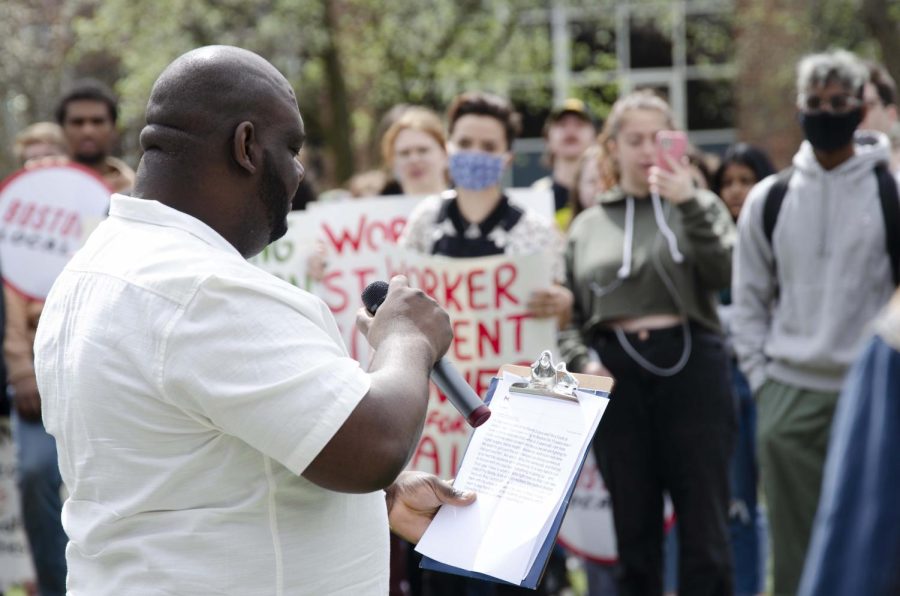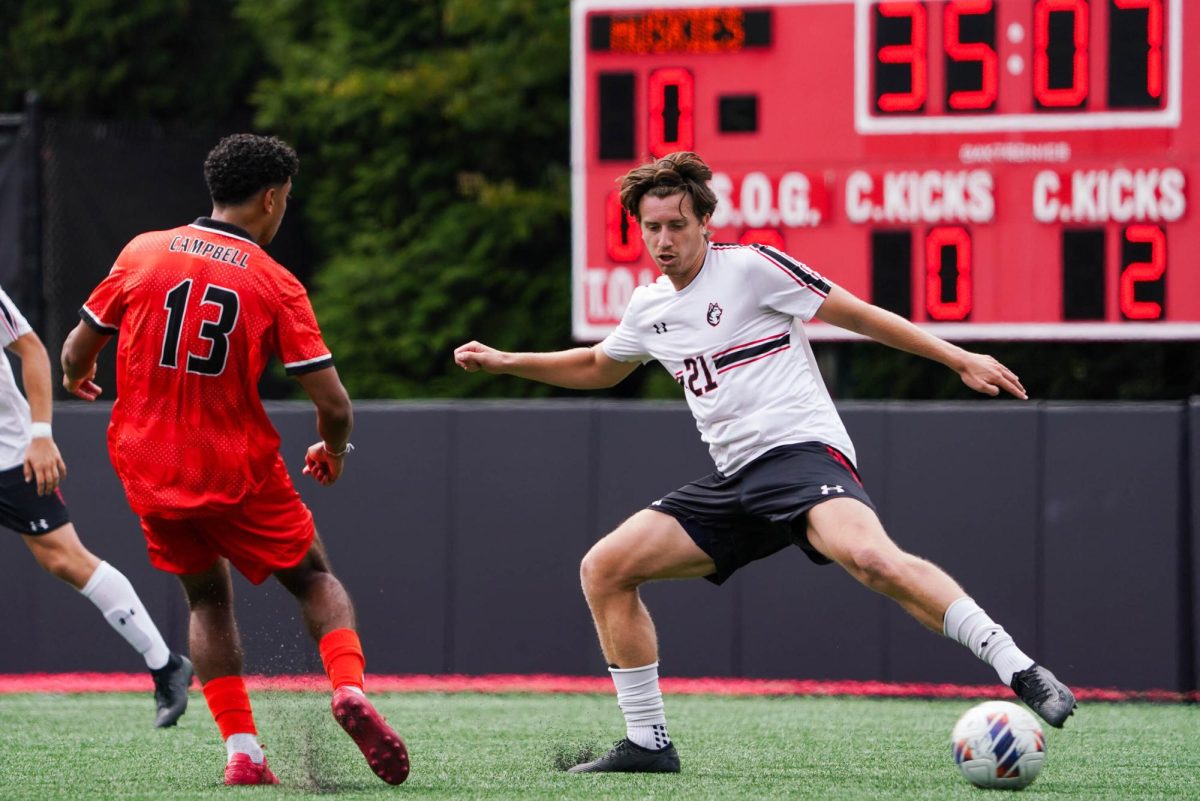Northeastern dining workers agree to historic new contract with Chartwells
A Northeastern dining hall worker speaks at a HOWL rally in April 2022. Rosario said the student-labor alliance provided dining workers confidence in negotiations with Chartwells.
September 28, 2022
Tuesday, Sept. 6 was an unusual night for Emajhonel Rosario, a 27-year-old grill cook at the United Table at International Village, and many of his colleagues. As the clock ticked past midnight, 30 dining workers comprising the unionized Contract Committee sat in a room at Suffolk University alongside representatives from UNITE HERE Local 26 Union, translators and higher-ups from Chartwells, the company contracted with Northeastern to provide dining services.
They had reached hour nine of what would be a 12.5-hour meeting to negotiate terms for dining workers’ new 5-year contract. When they emerged at 3:30 a.m., both parties had tentatively agreed to an unprecedented contract that raised wages by $9.32 per hour and ensured the best possible health plan offered by Chartwells, among other achievements.
“We as a committee had a main goal of five things that we absolutely needed … for this new contract to go into effect because we felt that these five things would help protect us as workers from any future issues,” Rosario told The News.
Besides better health insurance and pay increases that put dining workers on the same wage levels as dining employees at Harvard and MIT, those five goals included replacing workers that called out, guaranteeing a 40-hour work week and improving a pension plan for retiring employees.
“It’s the richest agreement that Local 26 has ever negotiated for any workplace,” said Carlos Aramayo, the president of Local 26. “It’s a life transforming agreement that I think will put these jobs in the category of good jobs that are worker-affirming, are family-affirming … and are community-affirming.”
Under the new contract, Chartwells guaranteed that 75% of jobs will be classified as full time. Workers in that category will be able to work 40 hours per week, raised from the 37.5-hour-per-week cap to which workers were previously restricted. Contributions to the current pension plan will also increase annually, eventually quadrupling the current rate. Worker strain will be reduced with a guarantee that Chartwells will cover for employees that cannot come to work, preventing coworkers from having to take on two to three job responsibilities simultaneously.
Aramayo said three factors contributed to the unusually long but ultimately successful bargaining session.
“One is, the dining hall workers walked in with 92% ready to go on strike right there. 92% of folks had signed a petition and taken their photographs saying that they were willing to go on strike if we didn’t meet our five core demands,” Aramayo said.
The second factor was support from the Northeastern student body.
The dining workers’ previous contract, which was set to expire Aug. 31, gained citywide attention last spring as workers publicly expressed their frustration with their working conditions. Dining workers teamed up with Huskies Organizing With Labor, or HOWL, to raise awareness and advocate for better terms in their upcoming contract. HOWL consists of a coalition of student groups including Young Democratic Socialists of America, or YDSA, NU Mutual Aid and Progressive Student Alliance.
Throughout the spring 2022 semester, HOWL organized rallies and marches on campus that pressured the administration to listen to the grievances of dining staff.
Joshua Sisman, fourth-year political science and economics combined major and president of YDSA, was one of the student organizers involved in the HOWL campaign that learned about the new contract before the general public.
“I was kind of shocked,” Sisman said. “I didn’t have words at first. … As someone who believes that the working class is … the agent of change, [that] those are the people that we need to be fighting with, fighting for, this is the kind of stuff that we dream to have happen.”
Rosario credited HOWL for playing a large role in providing the support they needed for their success.
“We don’t get anywhere without HOWL,” Rosario said. “Words can’t describe how important they were towards our cause. … Chartwells … is a very big corporation. So many of our co-workers were in fear. … They don’t want to lose their jobs. They don’t want to have to go on strike, whether it be for two or three weeks because Chartwells can hold out that long. But the amount of support that these students and the whole organization in general gave us [gave us] the confidence to say ‘Hey, we have people to back us up.’”
The final factor was Chartwells’ willingness to come to the table. Employees from the top levels of the corporation flew in for the meeting, which, Aramayo said, demonstrated their commitment to reaching an agreement.
“The company was actually willing to listen,” Aramayo said. “I think without those first two things, they may not have been willing to listen, to be honest. … The workers who were there felt very, very powerful. But also, we had, on the other side of the table, a company that was willing to listen to what we had to say.”
Rosario agreed the late night negotiations reassured him that Chartwells was determined to work with them and avoid a strike.
“Once it hit like one o’clock in the morning, we were all still there, still discussing and compromising. I’m like, ‘okay, you know what? They’re here,’” Rosario said. “‘They want to get this done. We’re here, we want to get this done. So let’s sacrifice the night, however much time it takes, to sit down and really be diplomatic about things’ And we were able to do that.”
Though many of the unionized dining workers care for families and experience long commutes, each member of the committee present at the table stayed until the very end of negotiations.
“The thing that was extraordinary is we had about 30 people on our bargaining committee and nobody left,” Aramayo said. “Everybody figured out how to stay, which I think shows you the seriousness with which the leader of our union took their responsibility.”
Herma Parham, a barista at Café Crossing and a member of the Contract Committee, said everyone in the room was hyped up, despite the length of the bargaining session.
“I didn’t expect it to run as long as it did,” Parham said. “It came out favorably, so I feel like the time wasn’t as important as the issues on the table being addressed and being finalized.”
As the Contract Committee closed in on an agreement around 3 a.m., the energy in the room was “hyped,” Parham said.
“Once it seemed clear that we were going to get there, people got pretty giddy,” Aramayo said. “We had to be like, ‘Everybody, keep it in the can because we have to actually get this done.’ We had a lot of conversations … about how you need to keep your poker face.”
Looking forward, some dining workers have already come to Aramayo to express interest in helping food service workers at other Boston-area universities advocate for better contracts for themselves.
Dining workers who spoke with The News also affirmed their commitment to continue strengthening the student-labor alliance with coalitions like HOWL.
“It’s a hand-in-hand situation,” Parham said. “If there’s anything that we can do, we will do it. And it appears as though [HOWL] is the same way that they feel so I was very, very happy to be part of the collaboration.”
The new contract is currently in effect and will last until Aug. 31, 2027. The provisions account for inflation and, by 2027, Northeastern dining workers’ wages will surpass workers at Harvard and MIT, according to Aramayo.
“We can set a standard for all the other universities to really feel inspired that, you know, we can do this, we don’t have to be afraid,” Rosario said. “We don’t have to fear anything. We are strong and we are one. We’re united.”







